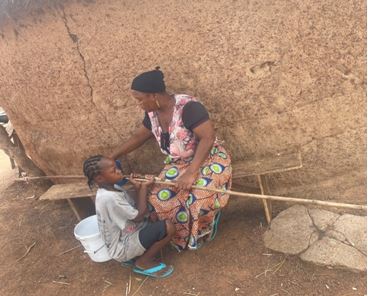
Sagnarigu, Northern Region– Amina Seidu and her family were still celebrating their daughter Ayisha’s second birthday when the little girl’s health took a frightening turn. Ayisha developed a persistent cough that quickly escalated. Ayisha’s breathing became labored, and she was irritable and feverish.
“One week after Ayisha celebrated her second birthday, she started coughing, but I thought it was normal because the weather was cold too, so I bought a cough syrup from the pharmacy for her,” says Amina. “But her condition did not improve. We stayed up all night because she coughed a lot.”
After two weeks Amina finally took her child to the hospital where a doctor diagnosed Ayisha with a severe upper respiratory tract infection. Ayisha received antibiotics and nebulizer sessions, and after weeks of treatment the little girl finally improved.
But the family’s relief was short-lived. Just six months later, Ayisha fell ill again. This time, the symptoms were even more severe and required more aggressive treatment.
Doctors told Amina the family needed to take drastic action: Ayisha needed to leave their home in Sagnarigu.
“The doctor told me, ‘The dust from untarred roads in this area is too much for your daughter’s developing lungs. Every day she breathes it in, it’s making her worse,’” recalls Amina with tears in her eyes. Amina had no choice but to send her little daughter away to live with relatives in a nearby community where the roads are paved and the air is significantly cleaner than in Sagnarigu.
Communities across Ghana are struggling with illnesses caused by dusty roads but this area is being impacted more than most. Sagnarigu, Amina’s hometown, has consistently recorded the highest number of upper respiratory tract infections in the Northern Region of Ghana. Out of more than 430,000 cases reported in the region in the past three years Sagnarigu Municipality has recorded the highest number – nearly 48,000.
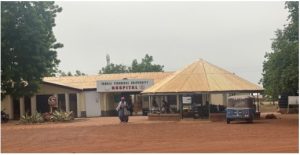
Road dust carries various types of pollutants into the air that, once inhaled, cause illnesses in the respiratory system, lungs and heart.
“When we inhale dust, it easily enters our bloodstream. The air we breathe contains many pathogens and germs,” says Dr Mark Abugri, director of Health Services in the Sagnarigu Municipal Health Directorate. “Our immune system and the mucous membranes in our nose usually protect us, but when these defenses are compromised, the risk of infection increases significantly.”
Air pollution is particularly dangerous to children whose small and developing systems are more vulnerable to damage from the pollutants they inhale. According to the State of Global Air Report 2024, Air pollution accounted for 8.1 million deaths globally in 2021, becoming the second leading risk factor for death, including for children under five years.
The report also foundthat in 2021, more than 700,000 deaths in children under five years were linked to air pollution, representing 15% of all global deaths in children under five.
Dr Martin Atuguba, a doctor at the Tamale Technical University Hospital, says that upper respiratory tract infections are among the most common conditions treated at the hospital. He says children under five frequently present with symptoms such as runny noses, fever, general malaise, and severe cough.
Dr Atuguba says that young children have higher sensitivity to environmental pollutants like dust. Their smaller airways can become easily irritated and inflamed by fine particulate matter, leading to more frequent and severe respiratory infections compared to adults, whose respiratory systems are more developed and resilient. Untreated or repeated respiratory tract infections can be dangerous and have lifelong impacts.
“Chronic and severe respiratory infections can lead to developmental delays in motor skills, language, and social interaction, affecting the child’s overall growth trajectory,” Dr. Atuguba bemoans. “The early years are critical for the development of a child’s immune system. Frequent infections can strain and sometimes weaken the immune system, making children more vulnerable to other diseases. Repeated respiratory infections can stunt a child’s growth and development.”
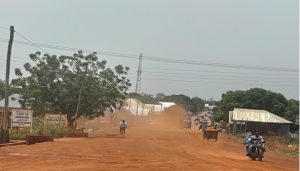
Dr Atuguba says he is deeply concerned about the health and long-term impacts of the road dust on the children in the community and has called on leaders to take urgent action to address the problem.
“Paving the roads would significantly reduce the amount of dust in the air, thereby lowering the incidence of respiratory infections among the community’s children,” he says.
Advocates in the community have been calling for action for a long time.
“The connection between poor road conditions and the high incidence of upper respiratory tract infections is quite significant,” says Godson Kofi Davies, a public health advocate here. “Paving roads to reduce dust generation can have a substantial impact.”
Davies also worries about long term impacts on children. “For children, inhaling fine dust can lead to asthma, bronchitis, and long-term health impacts like reduced lung function.”
In the short term he is calling for awareness campaigns to educate families like Amina’s about the danger of allowing respiratory symptoms to worsen before treatment is sought. “By the time individuals seek medical attention, the conditions have often deteriorated, leading to more severe health outcomes,” Davies says.
He also points out that dust particles often carry allergens such as pollen, mold spores, and pet dander, which can trigger allergic reactions and worsen respiratory or skin conditions in both children and the elderly.
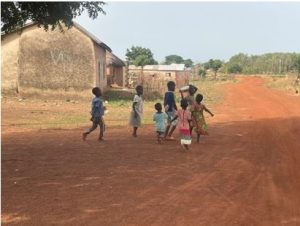
“Establishing a community monitoring system to continuously assess air quality and the effectiveness of interventions is essential,” he says.
Issah Baba, the Assemblyman for Sagnarigu, has been advocating for help from local and national governments. He says the community’s population of more than 20,000 people, are exposed to severe health risks due to dust pollution. Elderly and young, more vulnerable to pollution, are suffering the worst. Many families, like Amina’s are having to make heartbreaking decisions to move family members away.
Baba says that traders operating along these dusty roads often find their goods covered in dust by the end of the day – a sign of the significant amount of dangerous pollutants they are exposed to.
The Assemblyman details ongoing efforts to report these issues to relevant authorities but he says, until now, the hugely expensive cost of paving roads here never makes it to the top of the cash-strapped government’s list of priorities. He says he is angry that remote areas of the country like Sagnarigu are left out of the government’s development agenda.
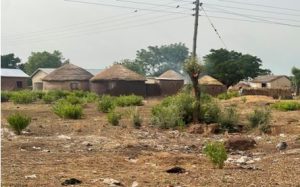
“Every time we include a lot of things in our budget, but we don’t realize that amount of money to carry out those projects,” Baba says.
In the meantime there is a lot that communities and individuals can do to protect themselves. Assemblyman Baba urges community members to adopt better environmental practices, such as stopping littering, and to follow speed limits to minimise dust generation.
This story was a collaboration with New Narratives as part of the Clean Air Reporting Project. Funding was provided by the Clean Air Fund. The funder had no say in the story’s content.








